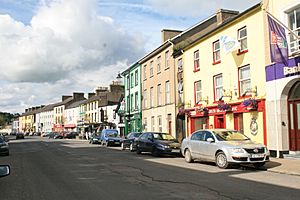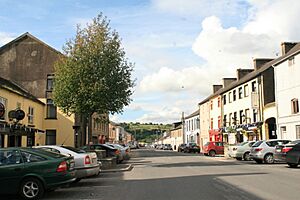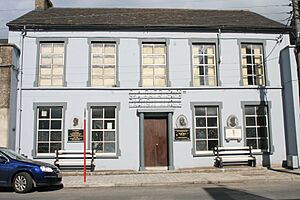Tallow, County Waterford facts for kids
Quick facts for kids
Tallow
Tulach an Iarainn (Irish)
|
|
|---|---|
|
Town
|
|

Main Street in Tallow.
|
|
| Country | Ireland |
| Province | Munster |
| County | Waterford |
| Municipal District | Dungarvan–Lismore |
| Town Charter | 1613 |
| Population
(2022)
|
1,022 |
| Time zone | UTC+0 (WET) |
| • Summer (DST) | UTC-1 (IST (WEST)) |
| Eircode routing key |
P51
|
| Telephone area code | +353(0)58 |
| Irish Grid Reference | W995934 |
Tallow is a town in County Waterford, Ireland. Its Irish name, Tulach an Iarainn, means "hill of the iron". Tallow is located in the province of Munster. It sits near the border between County Cork and County Waterford. The town is built on a small hill, just south of the River Bride.
| Historical population | ||
|---|---|---|
| Year | Pop. | ±% |
| 1813 | 2,258 | — |
| 1821 | 2,329 | +3.1% |
| 1831 | 2,998 | +28.7% |
| 1841 | 2,969 | −1.0% |
| 1851 | 1,986 | −33.1% |
| 1861 | 1,619 | −18.5% |
| 1871 | 1,332 | −17.7% |
| 1881 | 1,232 | −7.5% |
| 1891 | 1,088 | −11.7% |
| 1901 | 964 | −11.4% |
| 1911 | 849 | −11.9% |
| 1926 | 782 | −7.9% |
| 1936 | 779 | −0.4% |
| 1946 | 722 | −7.3% |
| 1951 | 716 | −0.8% |
| 1956 | 842 | +17.6% |
| 1961 | 819 | −2.7% |
| 1966 | 813 | −0.7% |
| 1971 | 883 | +8.6% |
| 1981 | 937 | +6.1% |
| 1986 | 867 | −7.5% |
| 1991 | 858 | −1.0% |
| 1996 | 802 | −6.5% |
| 2002 | 845 | +5.4% |
| 2006 | 911 | +7.8% |
| 2011 | 962 | +5.6% |
| 2016 | 946 | −1.7% |
| 2022 | 1,022 | +8.0% |
Contents
History of Tallow
Some old records show that a church existed in Tallow as early as the 12th century. This church might have been built even before the Anglo-Normans arrived. Lisfinny Castle, a strong tower house from the 15th century, stands overlooking the town. The Earl of Desmond built this castle.
Iron and Industry
Tallow was an important place for making iron a long time ago. This is why its Irish name means "hill of the iron." In the early 1600s, Richard Boyle, 1st Earl of Cork, helped the iron industry grow. He brought many English families to the Tallow area. By 1659, the "Old Forge" part of town had 51 people living there.
Tallow also became a center for sending grain down the river to Youghal. During the 1700s, people also prepared wool in the area. In the mid-1800s, the Great Famine caused many people to leave Tallow. This led to a big drop in the town's population.
Tallow in Parliament
Before the Act of Union in 1800, Tallow had its own group of representatives in the Irish House of Commons. This was from 1613 until 1800. In 1887, during a time of land disputes, Douglas Pyne was a MP for West Waterford. He hid in Lisfinny Castle to avoid arrest. Thousands of his supporters from Tallow came to help him. He managed to escape past the police.
Town Amenities
Tallow has several places to eat and drink, mostly on Main Street. The town's library opened in 1910. It was one of the many libraries built with money from Andrew Carnegie. Waterford City and County Council now manages it.
Other businesses in Tallow include a pharmacy, a vet, and a dairy shop. There is also a post office, a credit union, a hardware store, and an antiques shop. You can also find supermarkets and a café in the town.
Religion in Tallow
The main Catholic church in Tallow is the Church of the Immaculate Conception. It was built in 1826 on Chapel Street and is the tallest building in town. St Joseph’s Carmelite Monastery was started in 1836 on Convent Street. It is one of six Discalced Carmelite monasteries in Ireland.
St Catherine's Church of Ireland is on Mill Road. It was built in 1775. However, it closed in the 1960s because fewer people attended. The closest Anglican church now is St Mary's, Fountains, about 7 km away.
Sports and Activities
Tallow GAA is the local Gaelic Athletic Association club. They play Hurling at Páirc Éamonn de Paor, just outside the town. They compete in county and provincial games. The town also has a soccer club called Brideview United AFC. They play in the West Waterford East Cork League.
Fishing and horse racing are also popular local sports. The Tallow Horse Fair has been held every year in early September since 1904.
Getting Around Tallow
Tallow is located where three regional roads meet: the R627, R628, and R634.
Tallow Road railway station opened on September 27, 1872. It was part of the Waterford–Mallow railway line. The station closed on March 27, 1967. It was used by the Cork to Rosslare "boat train."
Today, Tallow has bus services called TFI Local Link. The 363 route connects Tallow to Dungarvan. It stops in Lismore and Cappoquin. This bus runs many times a day, every day. The 364 route links Tallow to Fermoy. It runs three times a day from Monday to Saturday. You can also book less frequent services to Youghal.
Education in Tallow
Scoil Mhuire, Tallow, is a Catholic primary school for both boys and girls. It was formed in 1980 when the town's older primary schools joined together. In 2023, 149 students attended the school. The closest secondary school is Blackwater Community School (BCS) in nearby Lismore.
Famous People from Tallow
At St Patrick's Parish Hall, you can find plaques honoring several people from Tallow:
- John Hogan (1800–1858) was a famous sculptor. He created many important religious sculptures in Ireland during the 1800s. He was born in Tallow.
- Tobias Kirby (1804–1895) was also born in Tallow. He was the head of the Irish College Rome from 1850 to 1891. He also became an archbishop.
- Frank Ryan (1900–1965), a well-known singer (tenor), grew up in Tallow.
Other people with family ties to Tallow include Academy Award-winning actor Edmond O'Brien. His parents lived in Tallow before moving to the United States. Charlie McCarthy, the father of former Republic of Ireland football manager Mick McCarthy, is also from Tallow. Waterford inter-county hurler and school principal Ned Power (1929–2007) played for and coached Tallow GAA. There is a statue of him at Tallowbridge. Former Senator and journalist Eoghan Harris lived in Tallow for his first five years. His father was a manager at Bride Valley Stores.
See also
 In Spanish: Tallow para niños
In Spanish: Tallow para niños





